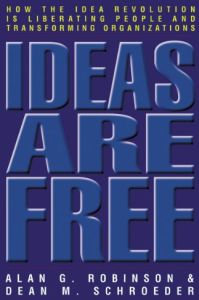Join getAbstract to access the summary!

Join getAbstract to access the summary!
Dean M. Schroeder and Alan G. Robinson
Ideas Are Free
How the Idea Revolution Is Liberating People and Transforming Organizations
Berrett-Koehler, 2004
What's inside?
Idea gathering means letting your employees use their brains.
Recommendation
Authors Alan G. Robinson and Dean M. Schroeder articulate a plain, obvious truth that hierarchical executives and managers may sometimes ignore: often the best ideas come not from the top, but from the little guy working in the cubicle or out on the assembly line. Their book predicts an ’idea revolution,’ where companies realize that their employees’ ideas are among their companies’ most valuable resources. The book reviews the basics of how to set up an idea-generating system, how to reward employees effectively and how to keep managerial egos out of the way. The authors discuss several case studies that demonstrate the power of a good idea. A new idea? No. One is reminded of Andre Gide, who said, "Everything has already been said, but because nobody was listening, we keep having to start all over again at the beginning." getAbstract recommends this book to any manager, executive or business owner who seeks powerful organizational improvements based on individual insight, creativity and innovation. Go ask a customer service clerk how to make things better.
Summary
About the Authors
Alan G. Robinson teaches at the Isenberg School of Management at the University of Massachusetts. He has consulted with more than 100 companies and government agencies worldwide, and is co-author of Corporate Creativity. Dean M. Schroeder founded two companies and led the financial turnarounds of two others. For five years, he served on the board of examiners of the Malcolm Baldridge National Quality Award. A member of the board of directors of the American Creativity Association, he currently teaches at the College of Business Administration at Valparaiso University.



















Comment on this summary